Table of Contents
- In this week's episode
- Summary of everything important discussed at Google I/O
- SGE: Search Generative Experience
- Google Perspectives - and soon a new update to further value experience
- Topics - appearing on desktop now
- SEO Tips and News
- AI News
- Local SEO
- SEO Jobs
- Subscriber Content
AI-Generated Answers: The New Face of Google Search: Episode 286 - May 15, 2023
Last week’s episode (285) See all episodes Subscriber Content
Google I/O was all about AI. And boy does Google have a lot in store for us. I’ve summarized everything below.
Most importantly:
- The search results pages will soon change so that Google shows an AI generated answer first. This is called SGE – Search Generative Experience.
- The pages show an AI generated answer front and center, with a small number of websites shown in a grid format to its right. The traditional search results are below that.
- The Verge says not all queries will generate an AI answer. “The AI only appears when Google’s algorithms think it’s more useful than standard results, and sensitive subjects like health and finances are currently set to avoid AI interference altogether.” Google’s documentation, discussed below, says they hold SGE to a higher standard for YMYL topics, so it sounds like it will eventually answer this type of query.
- Searchers will be able to search with much more detail, and ask followup questions.
In this episode
- AI answers & conversation in search
- Local Search impact
- Shopping
- Immersive view
- Photo editing
- PaLM 2
- Improvements to Bard
- AI in Gmail, Docs, Sheets and Lens
- Sidekick
- Collaborative coding
- Opportunities for businesses and developers with Google Cloud’s Vertex AI
SGE: Search Generative Experience – AI front and center in Google’s results
Google Perspectives – along with an upcoming update to further value experience
Topic filter bubbles now appearing on desktop.
Also, SEO Tips and News, AI News, Local SEO, and SEO Jobs.
This week’s subscriber content
- My thoughts on the impact of SGE on informational sites, eCommerce, Local businesses and sites writing on YMYL Topics
- Rethinking my advice for traffic drops starting February 24, 2022
- A thorough look at a site with multiple Google update hits
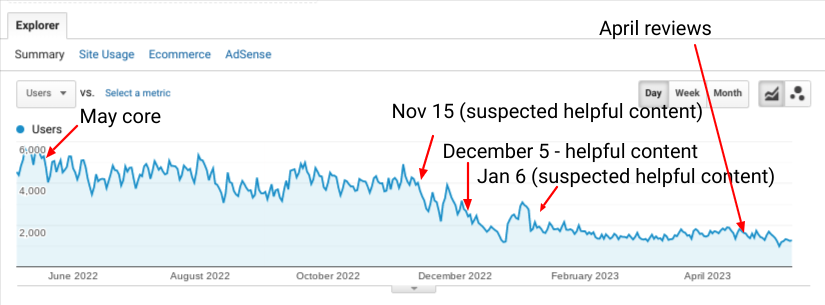
Summary of everything important discussed at Google I/O
Informational queries answered with an AI generated answer
I’ve taken some screenshots from the Google I/O video.
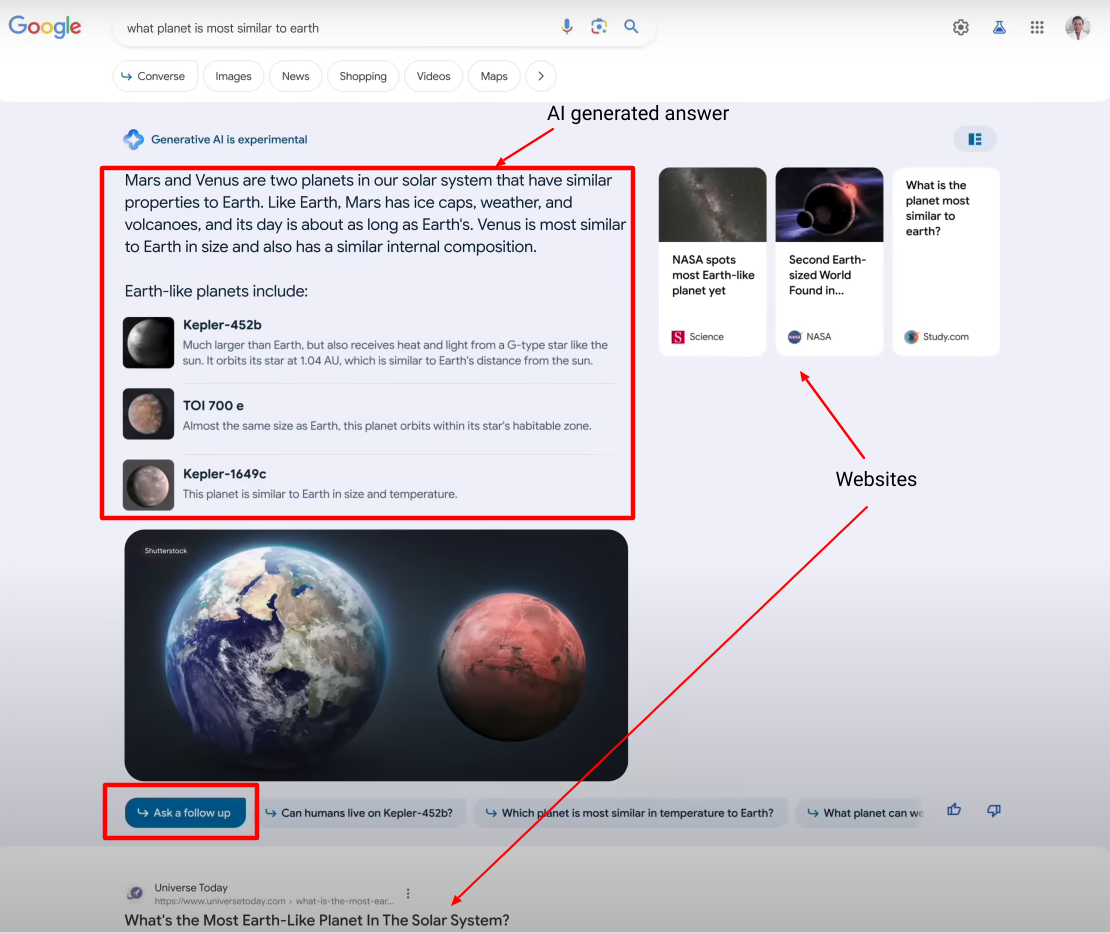
If your website exists to provide people with information, this change will likely cause a reduction in clicks, even if you rank in the top three. Google is still showing websites, but many users will be satisfied with the AI generated answer. For this example, websites that are featured are all ones with E-E-A-T – in this case, Science.org, NASA and Study.com.
Google says, “Even in a world where AI can provide insights, we know that people will always value the input of other people and a thriving Web is essential to that.

This is an interesting example as the websites listed are not hugely authoritative ones. They don’t have much E-E-A-T at all. In some cases their About pages list any little information. It seems to me on a quick look that these are really helpful articles for searchers who want to know more on plants for a dark dorm room. I expect these results will be heavily influenced by an upcoming update which will focus on personal experience. (More on that in the section on Perspectives.)
We’ve now got a new target for SEO…rank in the top 3 so you can appear next to the AI generated answers. We’ll need to create content that people find worthy of engaging with beyond the AI answer.
More detailed searches
The way we search now is going to sound archaic soon. We currently type a few keywords, click on some websites, go back to search some more and piece together the answer we are looking for. Now, Google does the work for us. We can do very specific searches like,
dress for an outdoor wedding in miami in may in a trending color with 2 day delivery


Ask Followup Questions
This is a big change to search. In Google’s video, they ask a follow up question, “what about shoes?”
Conversational search may take some time to get used to, but I expect many will use it.
Local Search impact
compare two lunch spots near me that are good for big groups

The most interesting part of this screenshot to me is the “people talk about” section. I expect this information is gleaned from looking at review information in the knowledge graph.
This should open up new ways of strategizing on ranking. What is it that sets your business apart? What are you known for? It will likely continue to be important to have verbiage that reflects these things on your website and also to find ways to get your customers to talk about your business online and leave reviews. Instead of ranking for keywords like, “lawyer in austin”, we’ll want to be known for certain topics, “lawyer known for dog bite injury cases”.
What will be most interesting though is digging into the queries that send people to our businesses. Although perhaps we may not get this information in GSC?
The video then shows the searcher typing, how about the high hat cafe.

Local Search is likely to change significantly with the introduction of more AI features. Google maps will soon be in Bard. Instead of typing, “plumber san diego”, searchers will likely turn to bard and have conversations like this:

Shopping
If you do any work with eCommerce sites, you should thoroughly read this article on the Shopping Graph.
The shopping graph:
- Is a large data set of the world’s shopping information, powered by machine learning.
- Stores billions of product listings, plus specific information about those products.
- Helps users find products with specific criteria even if they are complex.
- Powers Google’s shopping features
The graph is a knowledge graph containing loads of information about products, including user reviews, sellers, brands and even inventory data for specific retailers. There are over 35 billion listings from millions of merchants in the shopping graph with 1.8 billion updates every hour. They called it “the world’s most comprehensive dataset of constantly changing products, sellers, brands, reviews and inventory out there.”
Searchers can be really specific in finding what they want:
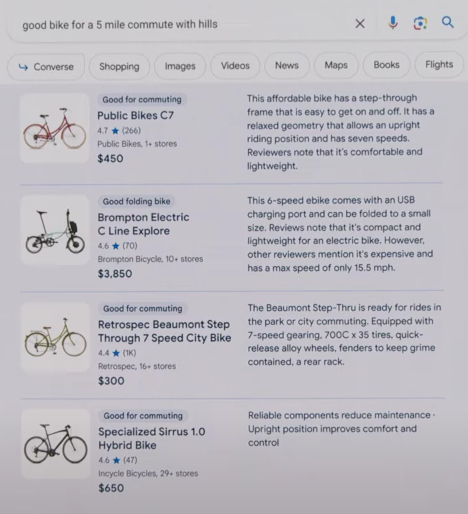
There will be ads in these results. Google did not share much about ads in this presentation. However, I suspect that AI will open up all sorts of new opportunities for valuable hyper targeted ads.
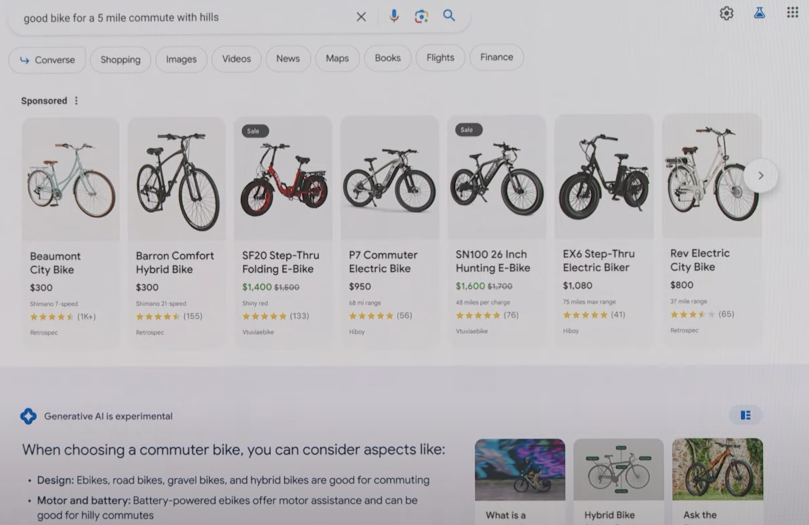
The new exciting thing for shopping is the ability to ask followup questions in conversational mode. In the example given, the searcher asked to only see bikes in red. When a bike is clicked on, a side panel opens showing which retailers have it in stock along with pricing, delivery and return information.
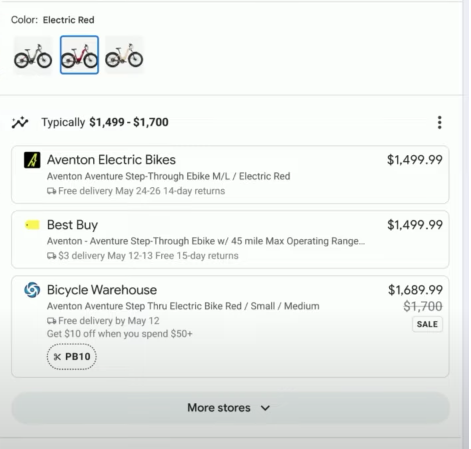
When you click on one of the bikes in Google's AI-generated answers (including products), it brings up a sidebar with multiple options for where to buy.
Good for merchants, not so great for product review sites.
*But* at least Google does show 3 links to publisher/review sites pic.twitter.com/TskcC6NNet
— Lily Ray 😏 (@lilyraynyc) May 10, 2023
Immersive view is mind blowing
Google demoed planning for a bike ride in NYC. Immersive view looks really cool.
You can zoom in anywhere to get a bird’s eye 3d picture of your route. This is rolling out in 15 cities by the end of the year.
From Street View ➡️ New Immersive View for routes in @GoogleMaps 🧵↓#GoogleIO pic.twitter.com/CMdR697hwm
— Google (@Google) May 10, 2023
Google photos and image editing
Magic Eraser and Magic Editor are really cool. You can very easily remove anything from an image, or grab one thing and move it around to somewhere else in the image. Or, you can move someone to the center of a photo and AI will create the parts that are missing. You can also change the lighting. 

This rolls out to Google Photos later this year.
PaLM 2
PaLM 2 is Google’s latest language model. ChatGPT uses GPT-3.5/4 as a language model. Bard used to use LaMDA, but now has been upgraded to PaLM 2.
I have noticed a big improvement in Bard’s utility with this upgrade. At I/O Google announced 25 products and features that are now powered with PaLM 2.
PaLM 2’s improvements include:
- Multilinguality – it’s trained on multilingual text spanning more than 100 languages.
- Reasoning – the dataset includes scientific papers and web pages with math expressions.
- Coding – it excels at coding in Python and JavaScript but also can generate things in other coding languages like Prolog, Fortran and Verilog.
PaLM has several models:
- Gecko – lightweight and fast – works on mobile devices
- Bison
- Unicorn
PaLM 2 really shines when fine tuned on specific knowledge. Sec PaLM is trained on security info, Med PaLM 2 is trained on medical data. As you’ll see below, it sounds like Google is giving us the capability to train PaLM on our own data. This is huge.
Gemini
A few times Google mentioned Gemini, their next model, Gemini – created from the ground up to be multimodal, highly efficient at tool, built to enable future innovations, like memory and planning. It is designed to be good at API integrations. It will eventually be available to all.
As an AI-first company, I'm so excited for what's coming, including Gemini, the new Google DeepMind foundation model in training that will have impressive multimodal capabilities not seen in prior models. Can't wait to share more in the future! #GoogleIO https://t.co/op8pIZgLK8
— Demis Hassabis (@demishassabis) May 11, 2023
Google did not mention Magi at this event. Perhaps Magi is the internal name used for Gemini by Google employees? Or perhaps it is the internal name for SGE – the Search Generative Experience.
Improvements to Bard – PaLM2 and exporting
Bard is now available (almost) worldwide. It is not available in a few countries, including Canada, apparently because regulation is more difficult. I sure hope this gets figured out. For now, I am using Bard with a VPN. It works well, although if I forget to turn off my VPN, ChatGPT won’t let me use it.
Soon, it will connect to many tools. This is a big deal. We’ll be able to draft something in Bard and export it to Gmail, Docs or Sheets. As mentioned earlier, it will also use Google maps.

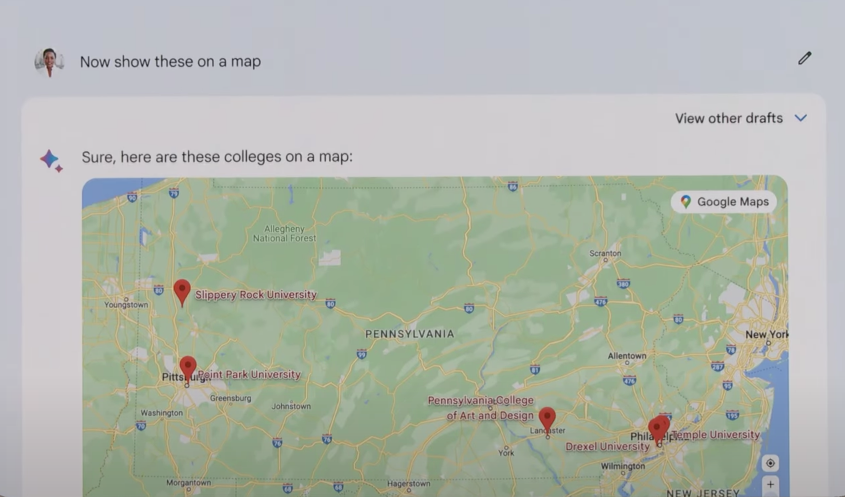
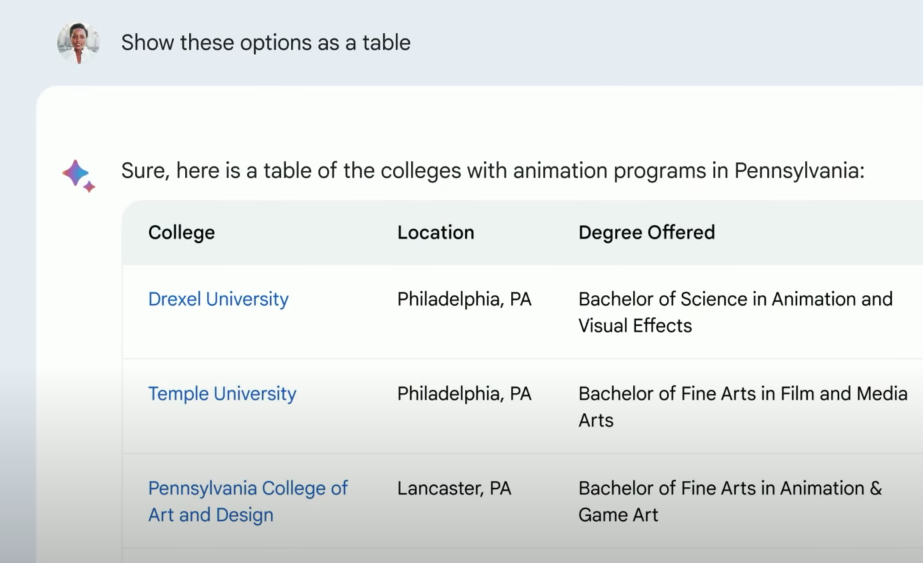


You can click a button to export to Sheets
As of now, I am not seeing image capabilities in Bard, but Google says that “in the next few weeks, Bard will become more visual, both in its responses, and your prompts.”
Google confirmed that Bard uses Google Search plus the Knowledge Graph to find the most relevant images to show.
Bard will eventually move to the Gemini model which will bring more advancements.
Lens
If you have tried Google Lens in the past and found it underwhelming, I’d encourage you to try it again. In my opinion, Lens is the thing that will most radically change the world.
Just now I held my phone up to my headphones. Then, I used this search box, to type in fix tear.

This is helpful. Imagine when Bard is integrated here. I can hold my phone up to anything and converse about it. The “answers” may come from websites or they might be completely AI generated.
Bard, here’s my fridge…what can I make for dinner that’s quick? Nah, not feeling like veggies tonight, what else can we make that’s still healthy?
What is this plant? why do the leaves have purple spots? does this look like aphids? Yes? Is there a product you recommend or should I try a home remedy? Show me a map of where I can buy this product.
I want to make a go-cart. Here’s what’s in my garage. Guide me through it.
I am greatly concerned for bloggers who have spent years writing content to answer questions like these. Yes, some people will seek out content from real people rather than an AI generated answer, but many will likely find the AI generated answer good and helpful.
3/ We’re bringing the power of Lens right into Bard — so you can be more visual in your prompts, and get more visual responses.
— Prabhakar Raghavan (@WittedNote) May 12, 2023
Gmail, Docs, Sheets and Slides
You will soon be able to generate a draft for an email or document by typing in a few words. Or a whole Google sheet by describing what it is you want to measure in this Sheet. The model makes up the columns and headings.
I like how Google is encouraging us to use their generative AI capabilities to create drafts, rather than looking at it as a tool that always produces a perfect answer. I think many are treating AI chat tools like a calculator, expecting perfection. I like to think of ChatGPT (and now Bard) as a helpful assistant who knows a whole lot about the world, but sometimes gets things wrong in conversation.
It still does make things up. I see many SEO’s hung up on this. The way I see it, there are two ways we can look at generative AI. We can point out the failings, or we can work to find its strengths. I encourage you to be in the latter camp. Businesses soon will be seeking out SEOs who know what to do with AI, and not those who know how to criticize it. If you are an SEO, you should be doing all you can to learn how these models work, especially Bard. ChatGPT is cool, and powerful…but given Google’s widespread worldwide use, Bard will likely be what is most important to pay attention to.
The changes to Slides sound exciting. I’ve been spending a lot of time in Slides lately and would encourage you to do the same! Soon, we’ll have image generation in Slides. Also, you can ask it to generate speaker notes for you.
These features start rolling out to trusted testers next month.
Sidekick
Google talked about “collaborating with AI” using Sidekick, a side panel. Open it up in Google Docs and it instantly reads and processes the entire document and makes suggestions for prompts.
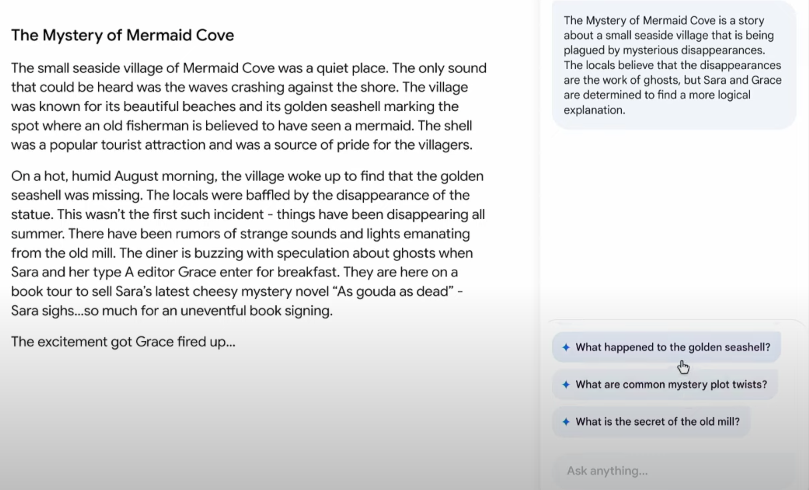
One of the prompts they showed was “suggest images for this story.” When clicked, it made up AI generated images to go alongside the story. It also suggested, “improve grammar.”
Collaborative coding
We will soon be able to code collaboratively, just like having multiple users contributing to a Google doc. The coolest thing is that you can do it in multiple languages.


Watermarking and metadata
Google’s AI image generating tech will always include watermarks on each image to indicate that it is AI generated. We’ll also have the ability to add metadata to images to associate additional context. These are steps taken to prevent spreading disinformation via AI generated images.
In the coming months, we’re launching a new tool called "About this image." It will show important context like when the image was first indexed by Google, where it may have first appeared, and other background information so you can get a better understanding of whether an image… pic.twitter.com/80w7I7OQkl
— Google SearchLiaison (@searchliaison) May 10, 2023
Opportunities for businesses and developers with Google Cloud’s Vertex AI
This is the most important thing to pay attention to out of all of the things discussed at I/O. Google Cloud’s Vertex AI platform has made it easy to quickly build things using their AI models. Soon, it sounds like any business will be able to use generative AI and also train models on their own data.

I have been raving about how ChatGPT plugins will change the world. (More people got access this weekend.) VertexAI is like ChatGPT plugins but more. From what I can see, the tools in VertexAI give businesses incredible capabilities.
You select which model you want to use and create prompts to tune the model.
You can create a database of your own company data or your website, all while guaranteeing privacy of your data. One of the concerns voiced over using ChatGPT plugins for your business is that there is little information over who controls the data.

It sounds like it will be really easy to build things with Google’s AI technology.
I am really hoping that we will be able to train a model on a large collection of Google Docs. I have so many Google Docs…years and years of writing furiously on everything that has happened in Search, brainstorming on theories, strategizing over clients’ ranking issues, documenting successes and failures. I suspect many of you have similar vaults of knowledge on the topics you are passionate about.
It sounds to me like I can possibly one day use Google’s conversational AI to do things with my data and then ask questions. The responses would be grounded in my data, but also would draw from the knowledge graph.
Perhaps I can have conversations like this:
Was there a Google update in February 2022? Which sites did I document as having traffic drops at that time? Make a table that shows each of these sites and summarizes the main problems found plus my recommendations. Connect with GA4 and find pages from each of these sites that declined at this time. Make a list of pages that have seen improvements in traffic since then. Analyze each of those pages in the eyes of this document I’ve created on site quality with a goal of determining what commonalities there are amongst pages that did well. Now, look at this page that declined in Feb 2022 and list suggestions for improvement.
Test these features out with Google Labs
A bunch of these features will be first available via Google Labs. You can sign up to be a tester, but only if you are in the US.
Google reached out to me and gave me a special link to sign up and soon, test things. You can bet that once I get access I’ll be playing with these nonstop.
Google Labs testers get to play with:
- Generative AI powered search
- Code tips
- Add to Sheets
More reading:
Supercharging Search with generative AI – Google
Introducing PaLM 2 – Google
Google’s new A.I. search could hurt traffic to websites, publishers worry – CNBC
The Google Search Generative Experience – All New AI Google Search Engine – SERoundtable
SGE: Search Generative Experience
Google published a PDF document called, “A new way to search with generative AI”, an overview of SGE. All SEOs should read this.
A few interesting points:
- Google used MUM to help people find related topics in videos even when those topics aren’t explicitly mentioned.
- SGE allows for people to ask entirely new questions you never thought search could answer, along with followup questions.
- SGE will show an AI powered snapshot, “when appropriate.”
- “Vertical experiences” are information journeys related to verticals, like shopping or local searches as they often have multiple angles or dimensions to explore.
- “SGE is built on Google’s Shopping Graph.”
- Ads will be present and will continue to evolve.
- The colour of the AI snapshot will dynamically change. “This usage of color will evolve over the next few months to better reflect specific journey types and the query intent itself.”
- SGE is currently powered by a variety of LLMs including an advanced version of MUM and PaLM2. These models are used in tandem with Google’s core ranking systems.
- The quality raters are used to “train the LLMs and improve the experience overall.” (Reminder that the QRG says the raters provide Google with examples of helpful and unhelpful results, which in my opinion are used to train the deep learning models.)
- “We hold SGE to an even higher standard when it comes to generating responses about certain queries where information quality is critically important. On Search we refer to these as “Your Money or Your Life” (YMYL) topics – such as finance, health, or civic information – areas where people want an even greater degree of confidence in the results. Just as we do in Search, for YMYL topics, SGE places even more emphasis on producing informative responses that are corroborated by reliable sources.”
- SGE was designed to not reflect a persona. It is meant to sound objective and neutral.
Here's the PDF Google produced on SGE. All SEOs should read it. https://t.co/Ppad1Wj9p8
— Marie Haynes (@Marie_Haynes) May 12, 2023
Google Perspectives - and soon a new update to further value experience
Google Perspectives are a new SERP feature announced this week. We have seen perspectives before, but just for news. Now, Users can tap on a perspectives filter to surface a Top Stories like feature from a variety of sources.
Google says, “Last year, we launched the helpful content system to show more content made for people, and less content made to attract clicks. In the coming months, we’ll roll out an update to this system that more deeply understands content created from a personal or expert point of view, allowing us to rank more of this useful information in Search. “
Google Perspectives:
"…pages based on first-hand experience, or are created by someone with deep knowledge in a given subject. And as we underscore the importance of “experience” as an element of helpful content, we continue our focus on information quality and critical… pic.twitter.com/hO3arThn82
— Marie Haynes (@Marie_Haynes) May 10, 2023
Google Perspectives goes live, is this the more snackable, more human, more youthful feature everyone was talking about – we predicted this one https://t.co/Ww7DSNAL7F pic.twitter.com/6yuh1SYTCC
— Barry Schwartz (@rustybrick) May 11, 2023
It's clear when you look of examples of pages that started to outrank competitors recently that it's legitimate actual real world experience that's being rewarded.
For example, a site giving information about site templates was outranked by a site that actually designs and… pic.twitter.com/tAznYymFlY
— Marie Haynes (@Marie_Haynes) May 11, 2023
Topics - appearing on desktop now
These topic filter bubbles that have been appearing on mobile are now visible on desktop for English searches in the US.

These are meant to help searchers refine their search. I expect they have impacted traffic for many sites since appearing on mobile in December. I noticed more of these appearing following the March Core update, and most recently on mobile for sites outside of the US.
Here's the announcement from when these first appeared on mobile. https://t.co/DsrJ0BbCOl
— Marie Haynes (@Marie_Haynes) May 12, 2023
SEO Tips and News
There is a new core web vital, INP – Interaction to Next Paint which assesses a page’s overall responsiveness to user interactions. We should be striving for an INP of 200 ms or less.
Here are a couple of useful links to better understand INP:
Interaction to Next Paint (INP)https://t.co/sJXfYDdQIn
Optimize Interaction to Next Painthttps://t.co/BVKNkW2G8D
— Pedro Dias (@pedrodias) May 11, 2023
Many sites are losing FAQ snippets.
Heads-up, Google removed many FAQ snippets on 4/5 from the mobile SERPs, but many remained on dtop. With the latest unconfirmed update, those dtop FAQ snippets are now gone. That makes sense & almost seemed like an oversight… I'm seeing this across many sites. It's widespread: pic.twitter.com/U5WYELxzbt
— Glenn Gabe (@glenngabe) May 8, 2023
And also favicons.
Weird to see favicons and site names missing from the desktop results this morning. This as we near I/O where there will be some big things announced search-wise. Also, while a pretty big unconfirmed algo update is rolling out (starting ~5/4). Stay tuned. pic.twitter.com/TJ3jho5Yfq
— Glenn Gabe (@glenngabe) May 8, 2023
How to steal your competitors’ featured snippets with ChatGPT – An excellent article by Tony Hill on SEL.
How to see organic traffic only in GA4.
This is a great conversation between Barry Schwartz and Glenn Gabe:
AI News and interesting info
In China there is a law against using AI to concoct and publish false information.
Google is going to pay the New York Times $100 million over the next three years to use its content on Google News.
OpenAI’s new Shap-E tool is Dall-E for 3D objects.
Wendy’s is using Google’s AI technology to take drive through orders.
The EU is moving to regulate AI.
Here’s a fun thread where Jess Peck tricked ChatGPT by asking it difficult riddles. It did not do too well. This thread gave me a great idea. I asked ChatGPT one of the riddles. It got the answer wrong, and so I asked it to analyze its answer. It told me why it was wrong and suggested something else. That too was wrong. I did this a few times until it finally told me that the riddle doesn’t have a solution and apologized for any confusion caused by previous results. The lesson I learned was that there is value in getting an LLM tool to critique its own work.
✨🌎 Introducing Geospatial Creator, a new tool to help you create world-scale, immersive #AR experiences in just a few clicks → https://t.co/mVsuSzdMgm
🔋 Powered by ARCore and @GMapsPlatform, available today in @Unity and @AdobeAero's Geospatial Pre-release.#GoogleIO pic.twitter.com/ccQ1zcEu3S
— Google AR & VR (@GoogleARVR) May 10, 2023
I just got access to Google’s new MusicLM and…
Wow.
No exaggeration when I say this will change the music industry. pic.twitter.com/YyG7wHWTSH
— Zack Hargett (@zackhargett) May 12, 2023
Local SEO
How to change your social media links on your GBP.
Google maps is coming to Bard. This will likely change how people search. We have a lot to learn most likely!
FINALLY Google maps coming to #Bard! #LocalSEO pic.twitter.com/zzfAOgVKGD
— Andy Simpson 🇬🇧 (@ndyjsimpson) May 10, 2023
Some queries that used to always return local packs, no longer do so consistently.
SEO Jobs
Looking for a new SEO job? SEOjobs.com is a job board curated by real SEOs for SEOs. Take a look at five of the hottest SEO job listing this week (below) and sign up for the weekly job listing email only available at SEOjobs.com.
Senior SEO Manager ~ Propellic ~ $85k-$92k ~ Remote (US)
Technical SEO Manager ~ SearchTides ~ $65k-$75k ~ Remote (US)
SEO Strategist ~ SearchTides ~ $60k-$85k ~ Remote (US)
SEO Accounts Manager ~ Wisevu ~ Remote (CAN)
SEO Executive ~ Bird Marketing ~ £21k – £27k+ ~ Remote (UK)
Subscriber Content
This week’s subscriber content
Subscribers get a PDF of newsletter on Fridays. The subscriber content is only found in the PDF.
- My thoughts on the impact of SGE on informational sites, eCommerce, Local businesses and sites writing on YMYL Topics
- Rethinking my advice for traffic drops starting February 24, 2022
- A thorough look at a site with multiple Google update hits

Want an email each week when I publish newsletter? Leave your details here:
Stay up to date on the latest on SEO & AI News
I'll send you an email each week once I've published newsletter.




